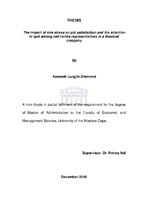| dc.contributor.advisor | Nel, Petrus | |
| dc.contributor.author | Diamond, Kenneth Lungile | |
| dc.contributor.other | Dept. of Economics | |
| dc.contributor.other | Faculty of Economics and Management Sciences | |
| dc.date.accessioned | 2014-01-15T07:14:09Z | |
| dc.date.available | 2011/05/16 09:07 | |
| dc.date.available | 2011/05/16 | |
| dc.date.available | 2014-01-15T07:14:09Z | |
| dc.date.issued | 2010 | |
| dc.identifier.uri | http://hdl.handle.net/11394/2556 | |
| dc.description | Magister Administrationis - MAdmin | en_US |
| dc.description.abstract | The call centre industry has been one of the fastest growing industries in South Africa. Call centres have for most companies become a basic business requirement for servicing customers. Zapf, Isic, Bechtoldt and Blau (2003: 311) argue that there are high levels of stress amongst employees in call centres, which they believe to be the result of both the work tasks and the interactions with customers. The aim of this study was to establish whether call centre work design and structure contributed to role stress amongst client service representatives (CSRs). It was also the aim of this study to establish whether role stress affected the CSRs' levels of job satisfaction and their intentions to quit from their jobs. | en_US |
| dc.language.iso | en | en_US |
| dc.publisher | University of the Western Cape | en_US |
| dc.subject | Call centre | en_US |
| dc.subject | Role stress | en_US |
| dc.subject | Role ambiguity | en_US |
| dc.subject | Role conflict | en_US |
| dc.subject | Role overload | en_US |
| dc.subject | Work-family conflict | en_US |
| dc.subject | Emotional exhaustion | en_US |
| dc.subject | Job satisfaction | en_US |
| dc.subject | Intention to quit | en_US |
| dc.subject | Client service representative | en_US |
| dc.title | The impact of role stress on job satisfaction and the intention to quit among call centre representatives in a financial company | en_US |
| dc.type | Thesis | en_US |
| dc.rights.holder | University of the Western Cape | en_US |
| dc.description.country | South Africa | |

